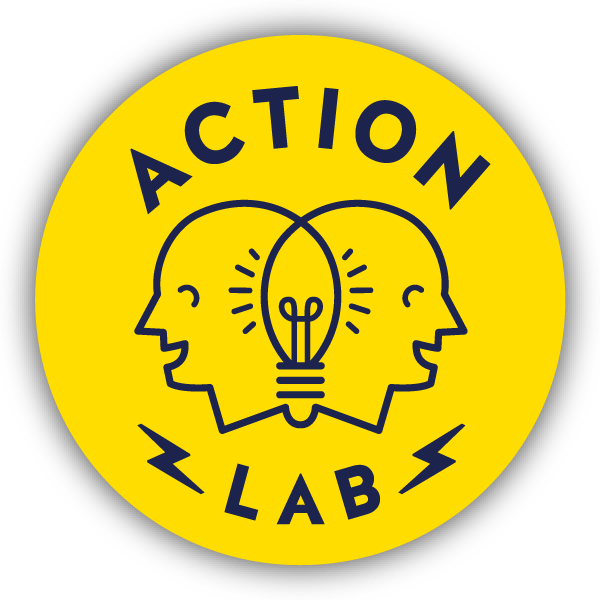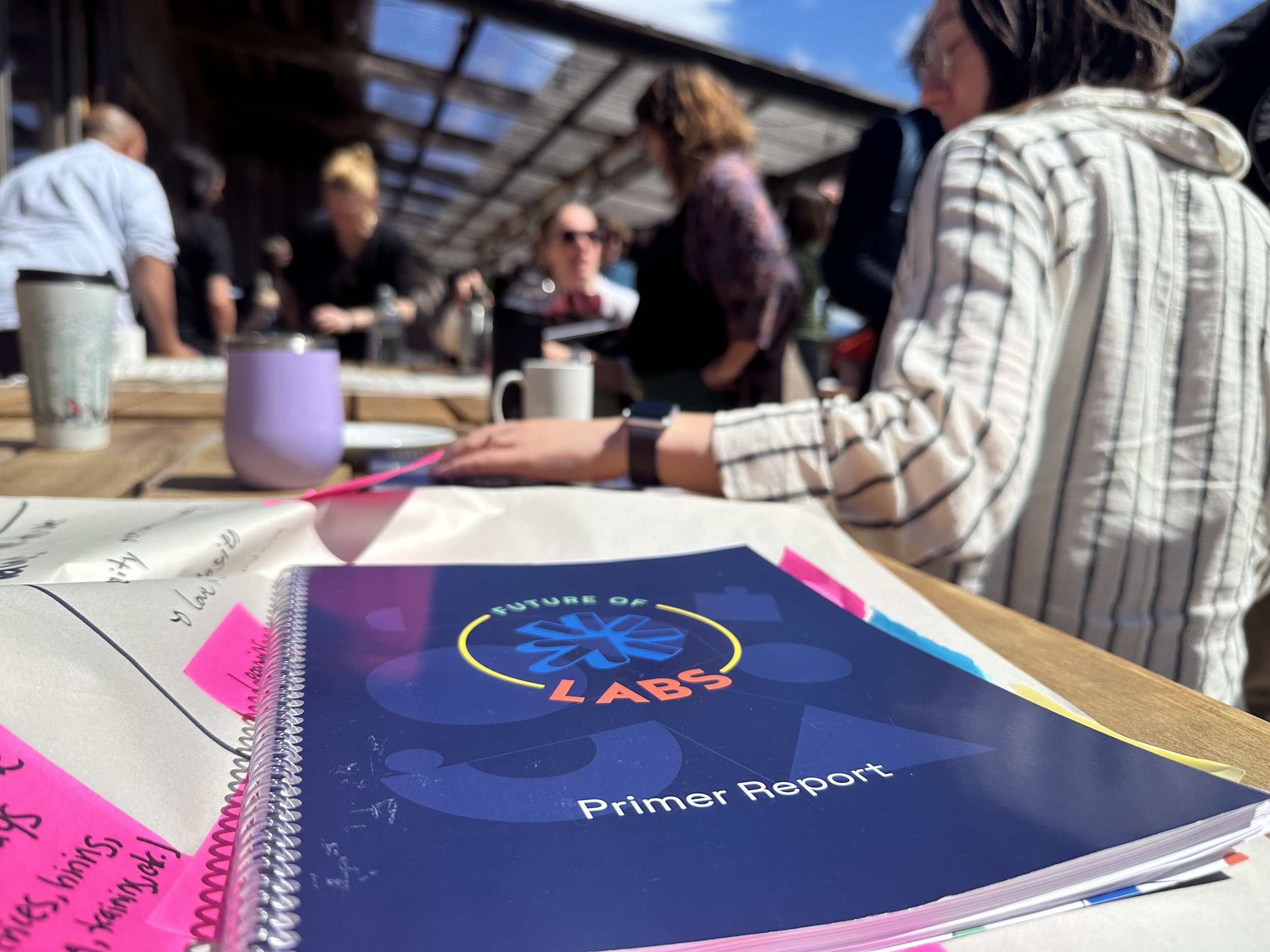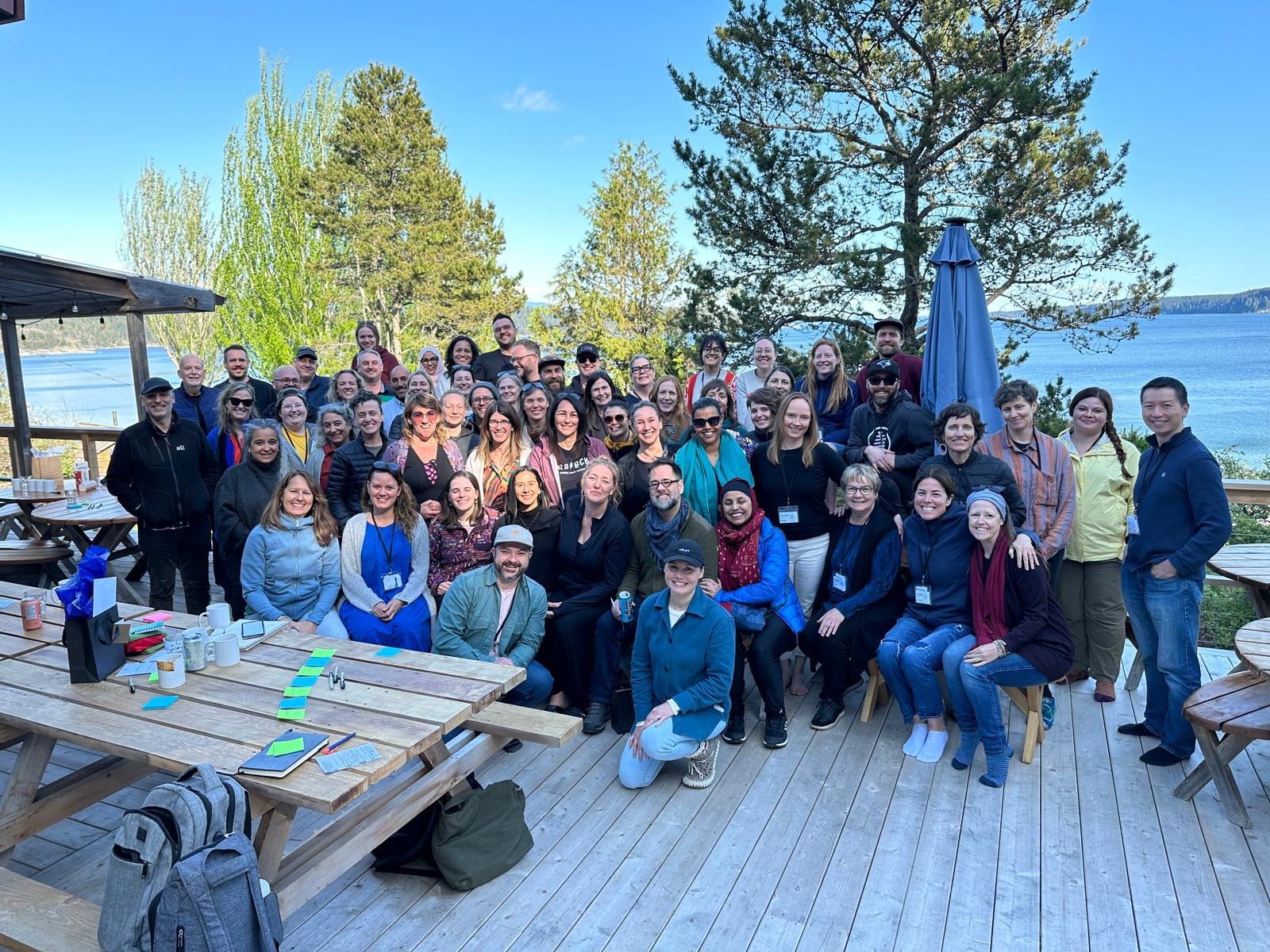Future of Labs: What might the next 10 years of lab practice look like?
Convened by Action Lab, Social Innovation Canada.
Sponsored by Social Innovation Canada, Action Lab, & Suncor Energy Foundation.
When it took place:
May 5th to 8th, 2024
Where:
Hollyhock Retreat Centre
Cortes Island, BC, Canada
What The Future Of Labs is About
At the Future of Labs, we brought together some of the most experienced pioneers and innovators who steward and design collective problem-solving lab practices. Future of Labs served as a catalyst for shaping the next ten years of effective lab approaches and a rare chance to connect experienced lab leaders who share the common goal of creating more impactful practices. The resulting work supports more people and systems to get better at tackling some of the most wicked challenges our world is facing today. Through pre-gathering research with diverse lab practitioners from across Canada and beyond, and through thoughtfully designed workshops, we looked deeply into what’s been working, not working, and what could be the next practices that labs and lab practitioners need to consider and build. Unique to Future of Labs, we produced pre-gathering learning reports from the field, 3 podcasts to make knowledge sharing more inclusive and a final after gathering report. These knowledge artifacts aim to help local, national and practitioners around the world to strengthen their practices as well as help funders and enablers of lab practice to better evaluate lab proposals.
The Future of Labs Primer Report
The Primer is a synthesis of some Lab history we know of, trends, data from a survey and focus groups with diverse Lab practitioners, a collection of inspiring examples of Lab practice, and some provocations to consider. We also have attempted, in a scrappy way, to trace the essence of some of the lineages of thought, philosophy, and practice underlying Labs, because it appears that many don’t know the roots of why Labs emerged and where they came from. This history is important for building impactful future practices and dispelling some common myths.
The Future of Labs Final Report
2024 Gathering Report & Recommendations for the Future of the Next 10 years of Labs
This report provides a synthesis of the conversations held at the Future of Labs gathering, summarising what was heard and initial impressions. The end of the report discusses potential working conclusions, recommendations, next steps, and questions for the field to consider.
Wicked Complex Podcast: The Future of Labs
Season 1 of the Wicked Complex podcast features a 3 part series around the Future of Labs Gathering in May 2024, where social innovation lab practitioners from around Canada and the world will be coming together on Cortes Island in British Columbia to try and figure out what the next 10 years of lab practice might look like.
Produced and hosted by Chris Chang-Yen Phillips
The Future of Labs - After
This episode is the third in a three part series around the Future of Labs Gathering in May 2024, where social innovation lab practitioners from around Canada came together on Cortes Island in British Columbia to try to figure out what the next 10 years of lab practice might look like.
This episode dives deep into key insights and actionable recommendations from the gathering report. The podcast guests (see below) explore what emerged during the gathering, key themes and patterns emerging in the field, and five bold recommendations for the future of Labs in Canada.
A shoutout and thank-you to our guests for this episode:
Annand Ollivierre, Team Lead at J5 Design and Future of Labs participant,
Rebecca Rubuliak, Director of Continuous Improvement and Innovation at Action Lab and Convenor of Future of Labs,
Ben Weinlick, Founder of Action Lab and Convenor of Future of Labs, and
Tim Draimin, Board Chair of Social Innovation Canada and Advisor of Future of Labs.
Description of Episode 1 - Before
In the first half of the episode, we’ll talk to some of the people who’ve been hard at work organizing this gathering, to try to find out what labs are capable of, where they stumble, and why they feel like labs in Canada are at a crossroads. Our guests in this first conversation are Ben Weinlick (Executive Director of Skills Society), Geraldine Cahill (Director of Engagement with Social Innovation Canada) and Mark Cabaj (President of Here to There Consulting).
Then in the second half, hear how Winnipeg Boldness Project Director Diane Roussin is using labs to make sure Indigenous families have a voice in defining the problems they want to solve. You'll also learn what she’s hoping for on Cortes Island, from finding ways to build awareness of labs to paying attention to the island itself together.
Description of Episode 2 - Cortes Island
This episode is the second in a three part series around the Future of Labs Gathering in May 2024, where social innovation lab practitioners from around Canada came together on Cortes Island in British Columbia to try to figure out what the next 10 years of lab practice might look like.
Many participants lent their voices to this episode, including Rose Hanson, Brenda Hanson, Lewis Muirhead, Meghan Durieux, Rhea Kachroo, Roya Damabi, Mark Cabaj, Geraldine Cahill, Miquel de Paladella, Ben Weinlick, Sophia Ikura, Maryam Mohiuddin Ahmed and Annelies Tjebbes, Alex Ryan, Keren Perla, Aleeya Velji, Heather Remacle, Diane Roussin, Cheryl Rose, Darcy Riddell, Brent Wellsch, Rebecca McSheffery, Rebecca Rubuliak, Melanie Thomas, Sarah Lamb and Julia Dalman.
The Future of Labs Gathering is convened and sponsored by Social Innovation Canada and Action Lab. Support for this podcast series comes from the Action Lab, the Edmonton Community Foundation, the Hamilton Community Foundation, and the Oakville Community Foundation. A special thank you to Suncor Energy Foundation for supporting the Future of Labs.
The Wicked Complex podcast is available on Spotify and Apple Podcasts
Chris at Hollyhock on Cortes Island with the ocean behind him.
Image of The Berkana Institute 2 Loops Framework [link to learn more about this framework].
The Future of Labs Primer on a piece of flip chart table at a table during an outdoor discussion at Hollyhock.
Kaiakum Lodge, a wooden building with hanging lights where G and Rhea had a discussion with others in a circle.
Geraldine “G” Cahill and Rhea Kachroo walking in the rainforest discussing the Berkana Institute 2 Loops Framework.
The Future of Labs delegates and conveners gathered on the deck at Hollyhock.
Knowledge Artifacts From Future of Labs
Future of Labs Primer
The Primer explores what has led us to now with labs: provocations and lessons learned, a synthesis of survey input, origins of labs and antecedent ideas, a collection of promising examples, what they’ve done well, what the collective is sensing is working and not working, and what needs to be considered for the next generation of labs.
Available Above.
The Future of Labs Report
Synthesis of all data, and developmental evaluation. What we heard. What we think labs can and can’t do. Principles to look for in the next generation of labs if you are a funder, sparker, or supporter of next lab practice. And tensions of labs.
Available Above.
Wicked Complex Podcast: Season 1 The Future of Labs
To make knowledge sharing more inclusive of Indigenous and oral traditions, we curated podcasts with Future of Labs attendees. Podcasts enable a greater reach of the knowledge generated and honour diverse ways of knowing and learning. This podcast series has been shared locally, nationally, and internationally.
The Wicked Complex podcast is available on Spotify, Apple Podcasts as and can also be accessed above.
Sponsored by Edmonton Community Foundation, Hamilton Community Foundation, and Oakville Community Foundation
Think pieces and provocations
Individuals and groups from the Future of Labs gathering are contributing thought-provoking pieces and reflections inspired by the event and its ongoing impact. These insights are being compiled here, with plans to develop a dedicated Future of Labs website in the future to serve as a hub for knowledge sharing and collaboration.
Possibility Space Webinar hosted by Social Innovation Canada
This webinar explores insights and recommendations from the Future of Labs final report. Hear from lab practitioners and changemakers about how social innovation labs can shape the next decade of systems change.
Watch here
Sam Rye's Reflections on the Gathering
In this four-part blog series, Sam Rye reflects on the Future of Labs gathering, sharing key takeaways about what’s working, what’s not, and where labs can go next.
Read Part 1: Foundations
Read Part 2: Reflections
Read Part 3: Report & Explorations
Read Part 4: The Language of Labs
Marlieke Kieboom's Blog Post: Shi(f)t for Humanity, Compost for Change
Marlieke reflects on the transformative role labs can play in creating regenerative change. She explores themes of self-reflection, relational practices, and learning to compost old systems to build something new.
Read the blog post
The Unregulators Comic by Alex Ryan and Keren Perla
This clever comic takes a lighthearted look at the quirks and contradictions of lab work, offering humour and insight into the challenges of systemic change.
View the comic
Brent Wellsch’s Blog Post: The Future of Labs and the Power of Co-Learning and Visioning with Fellow Practitioners
Brent Wellsch, Community Innovation Practice Lead at Urban Matters, reflects on key insights from the Future of Labs gathering. He explores how social innovation labs can drive change, foster collaboration, and create the conditions needed for lasting impact.
Why The Future Of Labs Matters Now
All sectors are under huge stress points - more leaders are recognizing how much society is challenged by transition and the current trend of a snap back to solutionism. Over-simplified solutionism in tackling complex challenges brings about short sighted quick-fixes that overshadow real systems change. Over the last 15 years, social innovation labs, innovations labs, impact labs, social labs, living labs, were launched by many pioneering change makers in the Canadian landscape. There have been federal and provincial-led labs, and many community grounded social labs. In talks with lab colleagues across Canada, many mature labs and lab practitioners are finding themselves in a reflective period. Lab approaches have shown promise in some ways for helping collectives to tackle tough challenges, but there are gaps and inconsistencies in methods, practices and impact.
Labs are at an inflection point.
Future of Labs and its particular focus on working with mature lab leaders and practitioners was also sparked by the recognition that many are considering dropping the term “lab” or already have, but they continue with various practices and disciplines of collective change making and problem solving. In addition, we’re wanting to look into the pioneering public and private sector labs in Canada and internationally that have shut down their entities, or changed the names and practices without being very specific as to what shifted or changed.
We believe we need to work together to explore (1) where labs make the most difference, (2) how they complement and/or are distinct from other systems change approaches, (3) how we might generate coherent practice possibilities for the next generation of labs, (4) codify what capabilities and eco-systems are required to support them, and (5) get clearer on what is reasonable to expect from the next generation of labs.
Finally, we know that funders, enablers and supporters of labs and lab-like processes need better sense-making tools and evaluation criteria to be able to assess lab proposals and their potential impact.
We also recognize the Future of Labs is one type of lab practitioner gathering and there are other very important gatherings and research explorations happening in tandem that are equally important and focus on nuanced aspects of lab and systems change practice.
Who is This Gathering For?
Seasoned practitioners who have designed and led lab processes. To explore the future of labs, there is a need to more deeply understand the past. To ensure harvesting of insights from seasoned practitioners, this gathering focused on inviting diverse and experienced individuals who have navigated the complexities of lab practices more than once. Hearing from colleagues across Canada, we believe this targeted approach will strengthen knowledge exchange and provide actionable takeaways for all participants. We are also extending invitations to international thought leaders and practitioners from organizations like TACSI, Griffith University Social Innovation Leads, Dark Matter Labs, Former Danish government Mindlab leads and Policy Lab UK. Although this won’t be the majority, there will also be enablers and funders of labs, both as sponsors of this gathering and who have an interest in strengthening lab practice to be more impactful.
The Convener Team
Research & design stewarded by:
Ben Weinlick, Anthony Bourque, Rebecca Rubuliak, of Action Lab, Diane Roussin of Winnipeg Boldness Project, Geraldine Cahill of Social Innovation Canada, Mark Cabaj Here2There Consulting, Patrick Dubé of Transition Bridges Project
There’s also a diverse collective of Canadian social innovation lab practitioners that comprise an advising committee, that the design team is testing aspects of our lab gathering approach, design, and research inputs/outputs.
Frequently Asked Questions (FAQ)
Why “Labs”?
This was intentionally a gathering about Labs: Social Innovation Labs fill a small but powerful niche in the larger ecosystem of efforts to make meaningful progress on complex challenges. It is not a slight to other systems change or justice approaches. We assume that Labs are ONE approach – not THE – approach to making change or the only way to tackle complex challenges.
‘Labs’ popped up for a reason 15 to 20 years ago: people, organizations and systems wanted spaces for more diverse actors to come together, to think and act systemically and experimentally to tackle complex challenges
The lab field has evolved considerably: the initial, broad and diverse enthusiasm was normal and now there is a need to more deeply discern and evaluate
We don’t want to boil the ocean of every systems change approach: we want some honest conversations about the past and future of Labs because it hasn’t really happened with seasoned practitioners and there is lots of knowledge out there about what’s working, not working and what needs to be developed further
This is a deep evaluative event: the intentional focus of this gathering is towards evaluating lab processes and stewardship. It’s not a general collective gathering of the labs ecosystem. We want people who know this work well and/or can support it to dig deeper on some key issues; this can be very hard to do if the event has too many people, or too many people who are only somewhat familiar with the work of labs the past 15-20 years.
What do you mean when you say a “Lab”?
This is actually one of the trickiest things to define for this event. It needed to be a sweet spot that was not too broad or too narrow. Below we have some working principles. Rather than create a ‘definition’ of Labs, we offered fundamentals or common attributes in most Labs [1] - the signature of how they were represented was diverse. Many were working on diverse content or challenge areas.
The intent of social innovation labs is to create a space for diverse change-makers to sense-make, generate, develop and test promising solutions to address complex societal challenges in a way that is collaborative, iterative (experimental), and systemic in thinking and action.
Minimum core principles of social innovation labs:
Focused on complex societal challenges
Brings together diverse perspectives from a system where there is a complex challenge being explored
Systemic in thinking and action
Experimental in developing and testing possible solutions
Aim at understanding root causes of complex challenges and then generating possible solutions and pathways from leverage points
One consideration for this gathering was that we didn't include labs that were exclusively incubator or accelerator social good labs, as these types of labs primarily focused on already created existing pilots or interventions that needed to scale. This Labs gathering focused on processes of collective problem solving, deep sense-making of root causes, ideation, testing of ideas, and evaluation.
1. Cabaj, Mark. November 10, 2023. Defining Social Innovation Labs: Somewhere Between a Butterfly and a Blueprint. Here to There Consulting. https://here2there.ca/blog/
What Are Some Of The Underlying Trends Informing The Future of Labs Gathering?
The Future of Labs gathering focused on working with mature lab leaders and practitioners and was sparked by the recognition that many were considering dropping the term “lab” or had already done so, but continued with various practices and disciplines of collective change-making and problem-solving. Another trend that was explored focused on the pioneering public, private, and community sector labs in Canada and internationally that had shut down, or changed their names and practices without being very specific as to what shifted or changed. There were signals that Human-Centered Design Thinking was too formulaic and didn’t address systems and root causes as well, but still a sense that deep ethnographic research and generative solution ideation remained in the realm of good practice.
There were signals and deep wisdom in the Canadian context to work on decolonizing practices. Indigenous knowledge was emphasized as important to weave into collective problem-solving if stewarded ethically and centered Indigenous leaders in co-design of processes, avoiding notions of oversimplified pan-Indigeneity.
There were also prominent tensions between the generative nature of common lab practices and the critical deconstructive practices of newer Critical Social Justice movements of the last 5-10 years.
There were also trends of some labs or collective problem-solving practices encouraging individuals that were part of collectives to work on spiritual systems inside themselves as a means to change systems outside. We wanted to look closer at these and more trends that emerged from pre-gathering surveys. This helped the field and future leaders to learn, tap into our collective hive mind of expertise, and see what promising possibilities emerged next.
More Questions?
Please feel free to direct questions to
actionlab@skillssociety.ca










